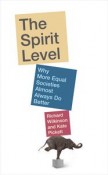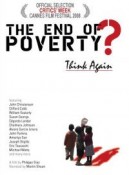Q&A: RICHARD WILKINSON & KATE PICKETT, Authors – The Spirit Level: Why More Equal Societies Almost Always Do Better
Written on February 5th, 2010 |
Aired 01/31/10
RICHARD WILKINSON & KATE PICKETT authors of an important new book: The Spirit Level: Why More Equal Societies Almost Always Do Better
In the UK, the Guardian says The Spirit Level "might be the most important book of the year, and The New Statesman named it one of the top ten books of the past decade.
Based on thirty years' research, The Spirit Level shows that unequal societies are bad for the well-off as well as the poor, when it comes to health and social problems, child well being, life expectancy, infant mortality, obesity, educational scores, drop out rates, illegal drug use, mental illness, homicide, incarceration, CO2 emissions, recycling, social mobility, innovation, and levels of trust.
The good news: If all these ills are related to one measure - income inequality, then, decreasing inequality should be the central goal of our politics because we can be confident that it works.
RICHARD WILKINSON has played a leading role in international research on inequality. He studied economic history at the London School of Economics before training in epidemiology, and is Professor Emeritus at the University of Nottingham Medical School and Honorary Professor at University College London.
KATE PICKETT is a senior lecturer at the University of York and a National Institute for Health Research Career Scientist. She studied physical anthropology at Cambridge, nutritional sciences at Cornell and epidemiology at Berkeley before spending four years as an Assistant Professor at the University of Chicago.
Q&A: PHILLIPE DIAZ – Writer and Documentary Director
Written on November 30th, 2009 |
Aired 11/22/09
PHILLIPE DIAZ is writer director of a new documentary THE END OF POVERTY that exposes the roots of the south’s poverty first in colonialism and then in the policies of the World Bank, IMF and the WTO.
The film features: Nobel prize winners in economics Amartya Sen and Joseph Stiglitz; expert authors Susan George, Eric Toussaint, John Perkins, Chalmers Johnson, government ministers such as Bolivia’s Vice President Alvaro Garcia Linera, and leaders of social movements in Bolivia, Brazil, Venezuela, Kenya and Tanzania.
THE END OF POVERTY’s opening line by narrator Martin Sheen: “Why, in a world of so much wealth, do we still have so much poverty, where billions of people live on less than one dollar a day?” According to writer-director PHILLIPE DIAZ, the ultimate goal of the film is to change the dialogue around the poverty debate from "poverty is a shame," to "poverty exists for a reason."
Born in Paris France, PHILIPPE DIAZ studied Philosophy at the Sorbonne in Paris, and began his film career as a director in 1980. He produced a number of features both in France and the US, and in 2003, with a consortium of partners he created Cinema Libre Studio, to provide an alternative structure for intelligent, independent films. His directorial debut, THE EMPIRE IN AFRICA won the Grand Jury Award for Best Documentary Feature at Slamdance 2006.
According to Diaz, “The end of greed on Wall Street will not end poverty in the world. The problem is much deeper than that; it is centuries old. Our economic system since colonial times requires cheap labor and cheap resources from the global South to succeed and to finance our lifestyle in the North. Without changing that we will never alleviate poverty.“
